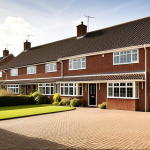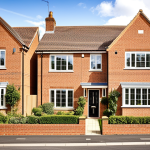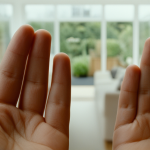Everyday Technology Integration Across UK Life
Technology in UK daily life now shapes how people live, work, and communicate. From morning routines to evening leisure, modern technology adoption has embedded itself deeply in households. Smart devices like voice assistants and connected home systems automate daily tasks, enhance comfort, and improve energy efficiency. For example, many UK homes use smart thermostats, lighting, and security systems, demonstrating the widespread integration of technology in UK daily life.
Digital transformation UK is evident in the growing reliance on digital platforms for essential services such as banking, shopping, and health consultations. Mobile apps allow quick access to public transport schedules, utility management, and government services, making everyday errands smoother. This dependence has accelerated with the expansion of online services, reflecting how modern technology adoption continues to evolve UK lifestyles.
Also to discover : How Is AI Transforming British Industries Today?
The adoption of these digital solutions contributes to convenience and broader accessibility, reducing barriers for those with mobility or time constraints. As technology in UK daily life advances, this trend points toward even more seamless integration of digital tools designed to support efficient, connected, and responsive daily living.
Everyday Technology Integration Across UK Life
Technology in UK daily life profoundly shapes everyday routines. For instance, many households adopt smart assistants like Amazon Alexa or Google Home to manage schedules, control smart devices, and access information hands-free. This modern technology adoption simplifies tasks such as grocery shopping reminders or playlist selection, saving time and effort.
In parallel : What Are the Latest Innovations in UK Technology Shaping the Future?
The digital transformation UK is further evident in home energy management. Smart thermostats adjust heating based on occupancy and weather, reducing energy waste while maintaining comfort. Similarly, smart lighting systems activate automatically, enhancing convenience and supporting energy efficiency goals.
A growing dependence on digital platforms for essential services underscores this integration. Mobile apps provide instant access to online banking, NHS appointments, and local council services. These tools reflect how technology in UK daily life facilitates access to critical resources without physical travel, particularly benefiting those with limited mobility.
In sum, households increasingly combine smart devices and digital solutions to streamline daily activities, showcasing how modern technology adoption and digital transformation UK work together to enhance living standards and accessibility. This layered integration suggests future growth opportunities for connected home innovations tailored to individual UK lifestyles.
Everyday Technology Integration Across UK Life
Technology in UK daily life increasingly guides how routines unfold, blending convenience with efficiency. Many UK households now depend on a synergy of modern technology adoption and digital platforms to smooth daily activities. For instance, smart kitchen appliances automate cooking schedules, freeing up time for busy families. Voice-enabled assistants manage calendars and control connected devices, making multitasking effortless.
This digital transformation UK extends beyond convenience; it fosters energy-saving and environmental awareness. Smart meters and sensors monitor consumption patterns, enabling households to adjust usage and reduce bills. Digital platforms, such as utility apps, provide real-time feedback and personalized tips, further deepening user engagement.
Dependence on digital platforms for essential services continues to grow. From arranging NHS appointments online to renewing transport passes via apps, users interact with government and public services digitally. This shift supports accessibility, especially for those in remote or underserved areas, cementing how technology in UK daily life acts as a vital link to critical resources.
Together, these developments illustrate a broad, ongoing modern technology adoption and digital transformation UK, reinforcing the integration of smart devices and digital solutions into everyday living across the country.
Everyday Technology Integration Across UK Life
Technology in UK daily life increasingly shapes how households manage both convenience and essential tasks. Modern technology adoption shines through smart kitchen appliances that automate meals, voice assistants that handle schedules, and connected home systems managing security and comfort with minimal effort. These devices work in concert to streamline routines, allowing more time for personal and family engagements.
Integration of smart devices extends to energy management, where smart meters provide real-time consumption data. Households use companion apps reflecting this digital transformation UK, enabling users to reduce waste and lower costs by adjusting behaviors based on precise feedback. This intersection of technology and behavior highlights how digital solutions actively promote sustainability.
Dependence on digital platforms for vital services deepens, shown by widespread use of banking apps, NHS booking portals, and council websites. These platforms embody technology in UK daily life by offering efficient, accessible options without requiring physical visits. This is especially crucial for those with mobility issues or busy schedules, illustrating how technology inclusivity supports diverse needs.
Overall, the synergy of smart devices and digital platforms highlights the evolving landscape of modern technology adoption and digital transformation UK, foundational elements in daily UK living today.
Everyday Technology Integration Across UK Life
Technology in UK daily life continuously reshapes routines, blending convenience with essential services. The modern technology adoption trend is evident in how connected devices, like smart fridges and security cameras, integrate seamlessly with mobile apps in UK households. This integration allows remote monitoring and control, enhancing both security and efficiency.
The ongoing digital transformation UK extends to how families manage their time and resources, using calendar syncing and meal-planning apps to coordinate busy schedules. These digital tools simplify organizing daily tasks, illustrating the shift from traditional methods to tech-enabled productivity.
Dependence on digital platforms is notably growing for essential services such as healthcare bookings, banking, and local government interactions. These platforms provide a flexible alternative to in-person visits, easing access for those with mobility challenges or tight schedules. Specifically, users benefit from immediate updates and reminders, boosting engagement and reducing missed appointments.
In essence, the synergy between technology in UK daily life, modern technology adoption, and digital transformation UK creates a framework where daily routines become more responsive and interconnected, reflecting a clear evolution in how people navigate both personal and institutional demands.
Everyday Technology Integration Across UK Life
Technology in UK daily life reshapes routines by seamlessly blending smart devices with digital solutions. For example, connected kitchen appliances coordinate cooking times with grocery apps, illustrating modern technology adoption improving efficiency. Voice-activated assistants play a pivotal role; they not only control home lighting and heating but also provide hands-free access to calendars and reminders, showcasing how technology enhances time management.
Integration extends beyond convenience. Smart home systems communicate with utility providers, enabling more precise energy consumption monitoring and supporting the digital transformation UK focus on sustainability. This integration helps households make informed choices, reducing environmental impact while controlling expenses.
Dependence on digital platforms for essential services grows notably. Users frequently employ mobile apps to book NHS appointments, manage finances, and liaise with local authorities. This reliance illustrates the broader trend of technology in UK daily life making public services more accessible, particularly for those facing mobility or scheduling challenges.
Together, these developments highlight how modern technology adoption, combined with digital tools, transforms daily living. The evolving ecosystem not only simplifies tasks but fosters sustainable, connected lifestyles tailored to individual needs across the UK.
Everyday Technology Integration Across UK Life
Technology in UK daily life deeply influences routines by blending smart devices with digital platforms. Many households coordinate multiple connected systems—such as smart kitchen gadgets, voice assistants, and energy management tools—to streamline daily tasks. This modern technology adoption enables seamless multitasking, from remote controlling appliances to receiving instant updates on household activities.
Digital transformation UK extends beyond convenience. It involves embedding intelligent sensors and apps into homes that track energy consumption and provide actionable insights, encouraging users to optimize usage sustainably. These advancements exemplify how digital transformation UK empowers individuals to make environmentally conscious decisions while reducing costs.
The growing dependence on digital platforms for essential services has become integral to everyday life. Users regularly access online banking, healthcare bookings, and local government services via mobile apps designed for flexibility and accessibility. This reliance highlights a broader trend within technology in UK daily life of shifting critical activities onto digital channels. For example, scheduling an NHS appointment online not only saves time but also addresses mobility constraints, reflecting an inclusive approach.
Altogether, this fusion of smart technology and digital services illustrates a comprehensive ecosystem where modern technology adoption, digital transformation UK, and technology in UK daily life combine to enhance efficiency, sustainability, and accessibility across households.
Everyday Technology Integration Across UK Life
Technology in UK daily life is now indispensable, reshaping routines with a blend of modern technology adoption and digital transformation UK strategies. Many households employ smart devices that communicate through centralized apps or voice assistants, creating interconnected ecosystems that simplify chores and enhance comfort. For example, smart fridges not only monitor food inventories but also sync with shopping apps to streamline grocery replenishment.
The integration of these technologies goes beyond convenience. By linking energy management systems with digital platforms, users gain real-time insights, enabling more sustainable consumption patterns—a core goal of digital transformation UK. This empowers individuals to reduce waste and lower utility costs effectively.
Dependence on digital platforms for critical services continues to deepen. UK citizens frequently rely on online portals and mobile apps for NHS appointments, banking, and government communication, illustrating how technology in UK daily life supports accessibility and efficiency. Such digital tools accommodate diverse lifestyles and needs, including those with mobility challenges or busy schedules.
Ultimately, this synergy of smart devices and digital services defines the current landscape of modern technology adoption in UK households, fostering a more connected, sustainable, and accessible daily living experience.








